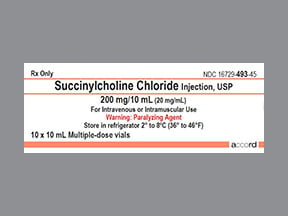
Quelicin Coupons & Savings Card – Discount Prices from $2.31
Brand for: Succinylcholine
My prescription
Edit
10ML of 20MG/ML, Succinylcholine (1 Vial)
Select pharmacy

CVS
$25.78
COUPON PRICE
Walmart
$2.31
COUPON PRICE
Albertsons
$9.14
COUPON PRICE
Walgreens
$11.43
COUPON PRICEQuelicin savings card
Show this card to your pharmacist
Walmart
$2.31
BIN
ID
PCN
GRP
019876
LH3995643D
CHIPPO
LHX
Powered by
Quelicin (Succinylcholine) dosage forms
Dosage Quantity Price from Per unit 10ML of 20MG/ML 1 Vial $2.31 $2.31 10ML of 20MG/ML 2 Vials $9.60 $4.80 10ML of 20MG/ML 3 Vials $12.42 $4.14
| Dosage | Quantity | Price from | Per unit |
|---|---|---|---|
| 10ML of 20MG/ML | 1 Vial | $2.31 | $2.31 |
| 10ML of 20MG/ML | 2 Vials | $9.60 | $4.80 |
| 10ML of 20MG/ML | 3 Vials | $12.42 | $4.14 |
What is Quelicin used for?
Quelicin is used as a muscle relaxant during surgical procedures. It facilitates tracheal intubation and provides skeletal muscle relaxation during surgery or mechanical ventilation.
What is the greatest risk of succinylcholine?
The greatest risk associated with succinylcholine is the potential for causing malignant hyperthermia, a rare but life-threatening condition. Additionally, succinylcholine can lead to hyperkalemia, especially in patients with certain neuromuscular disorders or burns, which can result in cardiac arrest.
What is the black box warning for succinylcholine?
Succinylcholine carries a black box warning for the risk of cardiac arrest, which is primarily due to acute rhabdomyolysis with hyperkalemia in pediatric patients. This risk is particularly higher in children with undiagnosed skeletal muscle myopathy, such as Duchenne muscular dystrophy. Therefore, its use in pediatric patients should be limited to emergency intubation or situations where immediate securing of the airway is necessary.
What is the indication of Quelicin?
Quelicin is indicated for use as a short-acting skeletal muscle relaxant during surgical procedures and other medical interventions that require muscle relaxation. It is commonly used to facilitate tracheal intubation and to provide muscle relaxation during surgery or mechanical ventilation.
Which adverse effect is caused by succinylcholine?
Succinylcholine can cause several adverse effects, including hyperkalemia, malignant hyperthermia, muscle fasciculations, and postoperative myalgia. It may also lead to bradycardia, especially with repeated doses, and in rare cases, it can cause anaphylaxis.
